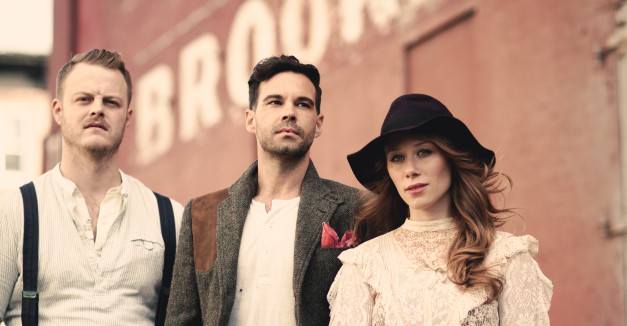It’s a nice thing to say: Resonating with a weeknight audience in some modest city can mean more than playing a CBS soundstage and hearing David Letterman purr your band’s name.
But there’s something very much within The Lone Bellow’s music that makes this more than a plain salt-of-the-earth sentiment. It holds for the same reason Brian Elmquist’s, Zach Williams’ and Kanene Pipkin’s voices have consumed each other the last four years, after a first singing experience that cemented their destiny to do so. Human beings, and the immediacy of experiences with them, have always spoken the loudest to the Brooklyn trio.
“Things that come fast go fast,” says Kanene Pipkin on the phone on Monday. “The lasting joy from [a TV appearance] is less than if I hear someone say, ‘Your music helped me through a hard time.’ That’s more sustainable encouragement.”
The roots band will come to Omaha’s Waiting Room Thursday night for a show with Tennessee songwriter Cereus Bright and the Omaha Americana band Clarence Tilton. RSVP here.
The Lone Bellow’s second album, this year’s Then Came The Morning is the product of an act that knows what it’s like to tour and grow with a collection of songs. For one, it’s sonically bigger than its predecessor, due in part to the upstate New York church where they recorded it, and to the work of producer Aaron Dessner, best known as being a multi-instrumentalist and songwriter for The National.
Absent Dessner’s hallmark musical qualities like polyrhymths, odd time signatures and intricate guitar parts, Pipkin says sincere encouragement is the most enviable gift the producer gave the album. She says it shows up from beginning to end, through redemptive stories that would seem to reach the metaphorical chapel ceiling of any dingy bar.
“Aaron instilled in us such confidence in the songs we’d written,” Pipkin says. “If you notice a confident tone, he really did give that to us. He loved the songs, and it made us very bold in the choices we made.”
A record so big, so bandstand-worthy almost certainly feeds into more passionate live performances, as well. Williams, for one, always appears to sing and emote to some far-off horizon.
https://www.youtube.com/watch?v=8A_6gKFItwc
“I definitely get sweat on a lot,” Pipkin says of performing with Williams. “And we had to ask him to stop putting his capo on the end of his guitar, because we had a few near misses.”
More seriously: “It’s nice that we can all bolster each other, so if someone wants to go a little off the deep end, the rest are there to hold down the fort. Make sure the instruments keep getting played.”
The songs themselves on Then Came The Morning can be seen a bit as oral histories, “family lore,” Pipken called it in one interview. There’s Southern roots in the band, though Pipkin was actually a regular Virginia-to-Omaha visitor in the summers of her youth, as her mom is a native.
“Almost every summer, [we] put five kids and two parents in a van and visited Henry Doorly Zoo, like it was nobody’s business.”
Then Came The Morning is capable of deep sadness, though such moments of hurt and betrayal most always give over to a fleck of light. In “Call To War,” on which Pipkin takes the vocal lead, there’s self-inspiration going on. It’s a “ramp-up song.”
https://www.youtube.com/watch?v=2Hj2WOjKsJE
“Especially on a second record you realize the songs you’re writing … you’re going to sing them all time,” she says. “And if you’re going to go to dark places, which is where our twisted minds just enjoy wandering, you know the weight of that decision is that you’ll have to go that place every night.”
Adding size and interpretability to the songs, Pipkin says, is key for inviting an audience to bring their own tribulations and hearts to offer. But even if it’s just the three balladeering Brooklynites on stage, there’s solace inherent to just three notes escaping their lungs.
“It’s something I’ve mused a lot about before, but the thing I really love about harmony singing: Everything is tempered by the fact that you’re never alone when you’re singing. It can only be so lonely.”




